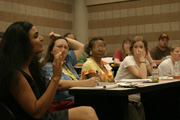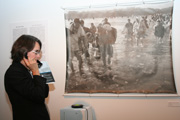- Campuses :
- Twin Cities
- Crookston
- Duluth
- Morris
- Rochester
- Other Locations

asias@umn.edu
612-625-6103
Community Outreach
South Asia Seminar Series
The South Asian Seminar Series brings scholars, writers, and filmmakers from the U of M, local colleges and universities as well as national and international speakers to share their ideas and scholarship with the University community and beyond.
Spring 2014 Schedule
Wednesday, MARCH 5, 2014
3:30-5:30 p.m.
710 Social Sciences
Building
Dia Da Costa, Department of Global Development Studies, Queen’s University
An ideology for life?: Towards an enduring vitality of activism in Delhi, 1973-present
Abstract: If there is no art or politics without resonance, how does an activism aimed at the industrial working-class endure in the face of a spatially and subjectively displaced working-class audience? How does such activism construct a vital ideological struggle attentive to the present? I approach this question by examining the place of affect in ideological struggle in the context of new spatializations and subjectivities of labour in contemporary India. Through an ethnographic analysis of a political theatre troupe in Delhi called Janam (Jana Natya Manch), I examine differing articulations of affective activism under shifting conditions of labour. I begin by looking at a previous moment where industrial workers and Janam activists collaborated in rewriting a play and scripting slogans during and after the seven-day strike of 1988 in Delhi. This moment expresses working-class investment in the politics of Janam’s representation. Since the strike, the steady erosion of labour rights has dispersed their primary audience. But despite such change, Janam’s dogged embrace of an ideology for life driven by older imaginaries has led to a representational dissonance between factory iconography and decentralized production processes, while dampening working-class connection to Janam’s cultural production. Yet I argue that, on the one hand, the vividly felt potential of 1988 at a time of systematically-wrecked labour rights should not be interpreted as activist false consciousness. On the other hand, recent strains of affect theory reproduce the binary of affect and ideology by viewing the former as an ideologically unencumbered site of hope. By contrast to constructing affective activism as a site of nostalgia for past potential or wishful thinking in the present, I argue that an enduring, vital ideology for life might involve re-envisioning cultural production as a space of representing new subjectivities, labour relations, and conditions in order to reconstruct belonging and counter its usurpation by capitalism.
Wednesday, APRIL 16, 2014
3:30-5:30 p.m.
710 Social Sciences
Building
Sharad Chari, Anthropology and Centre for Indian Studies in Africa, University of the Witwatersrand
An Indian Commons in Southern Africa?
Abstract: Early 20th century Durban was wrapped in a series of racial and spatial fictions, of a ‘black belt’ of shacks and market gardens surrounding a putatively white city reliant on Black labor and submission. This paper thinks with the remains of the early twentieth century in the early twenty-first, to ask how memories take hold of the past, disclosing multiple histories of dispossession, but also practices of commons-making. Against the odds, former indentured Indians steered between African exclusion and English racism; they transformed space and forged livelihoods as peasant-workers; they weathered the effects of epidemics and the Great Depression; and they planted fruit trees along with dwellings, mosques and temples. Transforming marginal lands and spatial routines, they rooted a particular creolized Indianness in Durban, just as a re-territorialized anti-colonial nationalism in India began to find its impoverished diaspora of little value. Dispossessed also by Indian nationalism, they poached the term ‘settler’ from colonial commemoration to mark their arrival on South African shores. A flow of artefacts continued to provide the means for authenticating Indian difference, and, crucially, a mimetic tradition of progressivism provided the social infrastructure to make what I call an ‘Indian commons’ that endures today. This remarkable historical event is entirely unremarked upon, but its presence is palpable across ‘Indian Durban.’ However, an ‘Indian commons’ is a contradiction in terms. Rather than celebrate subaltern ingenuity, I think antipodally with neighborhoods marked by mid-century as ‘Coloured’ Wentworth and ‘Indian’ Merebank. Without similar means of cultural authentication, without a parallel tradition of progressivist biopolitical expertise, among other things, Wentworth carries a sense of being out of step with its surroundings and its residents’ imaginations remain vagabond, unruly, ceaselessly imaginative. In dialectical relation to Indian ‘settlement,’ this nomadic metaphysics points to a revolutionary postracialism beyond claims to autochthony or landed property. Or, another commons-making is possible.
Wednesday, APRIL 23, 2014
3:30-5:30 p.m.
710 Social Sciences
Building
Vinay Gidwani, Department of Geography and Institute for Global Studies, University of Minnesota
The Waste-Value Dialectic: Lumpen Urbanization in Contemporary India
Abstract: We know Marx has a (complicated) theory of value. Does he also give us a theory of waste, or, more pointedly, ways to think about a waste-value dialectic that complements and interrupts the labor-capital dialectic? Can this waste-value dialectic stage an encounter between political economy and postcolonial theory and, if so, to what effect? I offer a preliminary assessment of these questions, drawing upon my engagement with Marx’s oeuvre and ongoing collaborative research on informal waste economies in Delhi and Hyderabad.
Wednesday, APRIL 30, 2014
3:30-5:30 p.m.
710 Social Sciences
Building
Richa Nagar, Department of Gender, Women, and Sexuality Studies, University of Minnesota
Traveling and Crossing, Dreaming and Becoming: Journeys after Sangtin Yatra
Abstract:This presentation is based on writing undertaken with members of Sangtin Kisaan Mazdoor Sangathan (SKMS) in Hindi and English between 2002 and 2012, and on reflections (shared with various academic and non-academic audiences) on that writing. In simultaneously documenting and critically examining the manner in which shared dreams and commitments evolve, succeed, and fail in an alliance, the writing raises questions about professionalization, expertise, and aspirations in the context of movement building. It also engages the politics of language by weaving together multiple genres, writing styles, and idioms to tell the stories of SKMS after the publication of the books, Sangtin Yatra and Playing with Fire, and in its growth as a movement. Reflexive activism and critical pedagogy get interwoven and extended as members of the movement work to trouble hierarchical structures of knowledge making, even as this co-authorship questions and complicates any romantic desire to seek lasting solidarity through alliance work.
Wednesday, MAY 7, 2014
3:30-5:30 p.m.
710 Social Sciences
Building
Anjali Arondekar, Professor of Feminist Studies and Literature at the University of California, Santa Cruz
Lyrical Summonings: Sexuality, Historiography, South Asia
Abstract: Sexuality endures as an object of historical recovery, it seems, through a poetics of melancholia, an irresolvable longing for loss that refuses all forms of consolations. My meditations call upon a historiography of sexuality in South Asia that pushes against the binding energies of such melancholic historicism.In the face of the casual brutality of dispersed suffering, any epistemological privileging of loss (past or present) assumes an eventfulness that flounders in everyday subaltern life. To fix sexuality primarily within such an arbitrary arsenal of loss (while politically exigent) is to refuse alternative histories of emergence. At its most ambitious, my talkruminates instead on more imaginative histories of sexuality, full of intrepid archives and acts of invention, full of pith and moment,full of lyrical summonings. To do so, Iengage the emergence of a Devadasicollectivity in Portuguese Indiaand pose three broad and vulgar questions: What happens if we abandon the historical language of search and rescue and focus instead on sexuality as a site of radical abundance – even futurity? How do queer collectivities in South Asia wrestle with the evidentiary forms that such models of loss demand, and, in doing so, how do they assemble historical archives that anticipate the compensatory gains that such losses should or will produce?
 Professor Richa Nagar makes a comment.
Professor Richa Nagar makes a comment.
 Shinparam performing at opening night of Still Present Pasts.
Shinparam performing at opening night of Still Present Pasts.
 Visitor listens to oral history while viewing an archival photo.
Visitor listens to oral history while viewing an archival photo.


